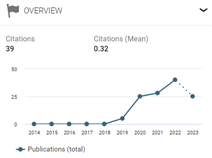Pengaruh penerapan program Sanitasi Total Berbasis Masyarakat (STBM) dengan kejadian diare di Wilayah Kerja Puskesmas Darul Imarah
DOI: 10.30867/gikes.v4i2.1261Abstract
Background: Sanitation is a dominant environmental health problem. Poor environmental conditions make contracting diseases such as diarrhea and infectious diseases easier. The problem in this study was how to evaluate the implementation of the community-based total sanitation program with the incidence of diarrhea in the working area of the Darul Imarah Health Center.
Objectives: This study aimed to determine the effect of community-based total sanitation program pillar 1 (Stop BABS) on the incidence of diarrhea.
Methods: This type of research is descriptive research with a cross-sectional study design. The sample in this study was the total population of 32 villages in the working area of the Darul Imarah health center. This study was conducted in February 2022. Primary and secondary data were collected. Data were collected through in-depth interviews and documentation studies at the Darul Ilmarah Health Center Data Section. The data collected included data on STBM programs in all villages, open defecation data, and open Defecation Free) data. Data analysis was performed descriptively to compare this study.
Results: Most of the residents who have private permanent healthy latrines built their sanitation facilities before the StBM program was first introduced by the government and puskesmas sanitation officers. The types of latrines used varied, with the average resident using a gooseneck squatting latrine and a gooseneck sitting latrine, most of which were equipped with a sanitary final disposal site for feces, namely a septic tank.
Conclusion: Implementing the first pillar of the STBM program or stopping defecation in the working area of the Darul Imarah Health Center has not yet reached the 100% target, and no village has reached ODF conditions. In addition, the incidence of diarrhea has increased from 2020 to 2021.
Keywords
Full Text:
PDFReferences
A’yunina, A., Joko, T., & Nurjazuli, N. (2016). Evaluasi Program Sanitasi Total Berbasis Masyarakat pada Pilar Pertama Stop BABS di Kabupaten Pekalongan. Media Kesehatan Masyarakat Indonesia, 19(6), 402–411.
Al Rahmad, A. H., Iskandar, I., Fadjri, T. K., & Hadi, A. (2022). Utilization of the Growth Chart module in Increasing Mother’s Knowledge to Monitor the Grow up of Toddlers. Kesmas Indonesia, 14(1), 110–120. https://doi.org/10.20884/1.ki.2022.14.1.640
Blegur, A. Y., & Purnama, I. G. H. (2014). Evaluasi Pencapaian Program Sanitasi Total Berbasis Masyarakat Pilar Pertama di Wilayah Kerja Puskesmas Kawangu Kabupaten Sumba Timur (Studi Kasus di Desa Kambata Tana). Community Health, 1(2), 1.
Dinas Kesehatan Aceh. (2021). Laporan Kinerja Dinas Kesehatan Aceh Tahun 2020. Kementerian Kesehatan RI.
Herniwanti, H., Sudarto, E., & Ardiana, A. (2022). Penyuluhan Sanitasi Total Berbasis Masyarakat (STBM) Pilar 1–Stop Buang Air Besar Sembarangan (BABS) di Kecamatan Bengkalis, Riau. Jurnal Abdidas, 3(3), 465–473.
Indah, F. P. S., Ismaya, N. A., Puji, L. K. R., Hasanah, N., & Jaya, F. P. (2021). Penerapan Program Sanitasi Total Berbasis Masyarakat (STBM) dengan Kejadian Diare pada Balita. Jurnal Ilmiah Kesehatan, 20(1), 10–15.
Monica, D. Z., Ahyanti, M., & Prianto, N. (2021). Hubungan Penerapan 5 Pilar Sanitasi Total berbasis Masyarakat (STBM) dan Kejadian Diare di Desa Taman baru Kecamatan Penengahan Kabupaten Lampung Selatan. Ruwa Jurai: Jurnal Kesehatan Lingkungan, 14(2), 71–77.
Muhid, A., & Fahmi, L. (2018). Perubahan Perilaku Open Defecation Free (ODF) melalui Program Sanitasi Total Berbasis Masyarakat (STBM) di Desa Babad Kecamatan Kedungadem Kabupaten Bojonegoro. Engagement: Jurnal Pengabdian Kepada Masyarakat, 2(1), 99–119.
Oktarizal, H., & Pramawati, A. (2020). Program Sanitasi Total Berbasis Masyarakat Pilar Pertama di Kabupaten Bintan tahun 2019. Jurnal Kesehatan Ibnu Sina (J-KIS), 1(02), 1–10.
Rachmawaty, P. P. A. (2022). Hubungan karakteristik kepala keluarga dengan penerapan 5 pilar sanitasi total berbasis masyarakat (STBM) di Kelurahan Sesetan tahun 2022 [Poltekkes Kemenkes Denpasar Jurusan Kesehatan Lingkungan 2022]. http://repository.poltekkes-denpasar.ac.id/8882/
Riyanto, E., & Adifa, R. F. N. (2016). Hubungan tingkat pengetahuan, pendidikan, dan pola hidup bersih dan sehat ibu terhadap kejadian diare pada balita di puskesmas sitopeng kota cirebon. Tunas Medika Jurnal Kedokteran & Kesehatan, 3(4), 95–102.
Rohmah, N., & Syahrul, F. (2017). Hubungan kebiasaan cuci tangan dan penggunaan jamban sehat dengan kejadian diare balita. Jurnal Berkala Epidemiologi, 5(1), 95–106.
Siahaan, S., & Fauziah, R. (2019). Hubungan Ketersediaan Jamban, Perilaku, dan Pengetahuan Masyarakat dengan Buang Air Besar di Kelurahan Legok Kota Jambi Tahun 2018. Sanitasi: Jurnal Kesehatan Lingkungan, 11(2), 85–91.
Siyam, N., & Cahyati, W. H. (2018). Penerapan School Based Vector Control (SBVC) untuk pencegahan dan pengendalian vektor penyakit di sekolah. Media Kesehatan Masyarakat Indonesia Universitas Hasanuddin, 14(1), 86–92.
Sumolang, P. P., Nurjana, M. A., & Widjaja, J. (2019). Analisis Air Minum dan Perilaku Higienis dengan Kejadian Diare pada Lansia di Indonesia. Media Penelitian Dan Pengembangan Kesehatan, 29(1), 99–106.
Sunardi, & Ruhyanuddin, F. (2017). The Impact of Hand Washing on the Incident of Diarrhea among School-Aged Children at the District of Malang. Jurnal Keperawatan, 8(1), 85–95.
Syahrizal, S. (2017). Hygiene Sanitasi Penjamah Makanan Terhadap Kandungan Escherichia Coli Diperalatan Makan Pada Warung Makan. AcTion: Aceh Nutrition Journal, 2(2), 132–136.
Syahrizal, S. (2022). Hygiene dan sanitasi pada beberapa rumah makan. Studi kasus di Kecamatan Darul Kamal, Aceh Besar. Jurnal SAGO Gizi Dan Kesehatan, 3(2), 150–156.
Trisiyani, G., Syukri, M., Halim, R., & Islam, F. (2021). Faktor Risiko Kejadian Diare pada Anak Usia 6-24 bulan di Kota Jambi. Jurnal Sehat Mandiri, 16(2), 158–169.
Umbulharjo, J. P. D. S. J. (2020). Kepemilikan Jamban Sehat di Masyarakat Pesisir Desa Binjai Kecamatan Bunguran Barat Kabupaten Natuna. Jurnal Dunia Kesmas, 9(3), 110–119.
Weiland, S., Hickmann, T., Lederer, M., Marquardt, J., & Schwindenhammer, S. (2021). The 2030 agenda for sustainable development: transformative change through the sustainable development goals? Politics and Governance, 9(1), 90–95.
Refbacks
- There are currently no refbacks.














